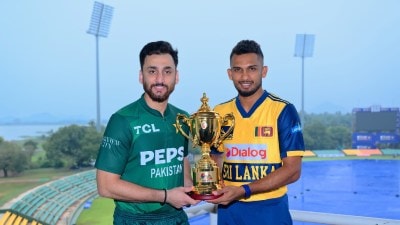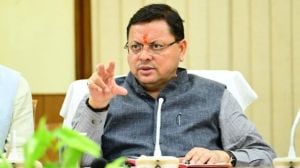Samsonov heir apparent to TT crown
Eindhoven, The Netherlands, Aug 5: Vladimir Samsonov makes table tennis look so easy that critics have labelled him unspectacular, unex...

Eindhoven, The Netherlands, Aug 5: Vladimir Samsonov makes table tennis look so easy that critics have labelled him unspectacular, unexciting and even boring.
Yet the man from Belarus says that underneath his economic, quiet style and his calm, collected demeanour, there is another side.
8220;I get angry when I lose,8221; the 23-year-old said, 8220;But not so angry that it8217;s the end of the world. There are more important things in life.8221;8220;Table tennis is an important aspect of my life at the moment and its fun. It8217;s job and hobby in one. But it is not everything. At least I hope not.8221;This week, Samsonov chases a maiden World Championship title in Eindhoven, the site of his first major triumph where he beat Croatian Zoran Primorac last year to become European champion.
At the 1997 Worlds in Manchester, Samsonov was runner-up to Swedish double World and Olympic champion Jan-Ove Waldner and said later he was 8220;so upset because I played my best table tennis and still didn8217;t have a chance againstWaldner.8221;
However, Samsonov gives the same importance to a table tennis title as he does to education, going to the cinema and reading. His favourites books are Russian classics, such as those by Tolstoy, and the Bible. 8220;It8217;s difficult for me to say whether I believe in god. I hope that there is one,8221; he said. 8220;I hope that the good will always win over the bad but that isn8217;t always the case.8221;
Samsonov said he really began reading newspapers closely during the Kosovo crisis and Nato airstrikes against Yugoslavia as his Serbian girlfriend Natasha lives in Belgrade.
8220;I couldn8217;t believe bombs were falling on her hometown. It seemed like something from another world.8221;
Samsonov, who comes from Minsk but lives in Dusseldorf, Germany, began his table tennis career at the age of seven under the strict sporting system of the former Soviet Union.
His talent was immediately recognised and at the age of 10, he was sent to a special sports school. He won all the important junior titles.
8220;I would adviseall young aspiring players first to finish school and then to train a lot. Talent alone does not make the master,8221; is his message.Before coming to Eindhoven, he trained intensively for a week with the Austrian team and said that in future he would like to concentrate more on his mental preparation.
8220;For the moment, I try to visualise a match and the result before an event. But I would like to concentrate more on the mental side.8221;
What he doesn8217;t want is the fame and pressure that athletes from more popular sports such as tennis have to contend with.
8220;For sure they earn more money but I8217;m not jealous. They have so much stress from the media I definitely wouldn8217;t want that,8221; he said.
- 01
- 02
- 03
- 04
- 05































